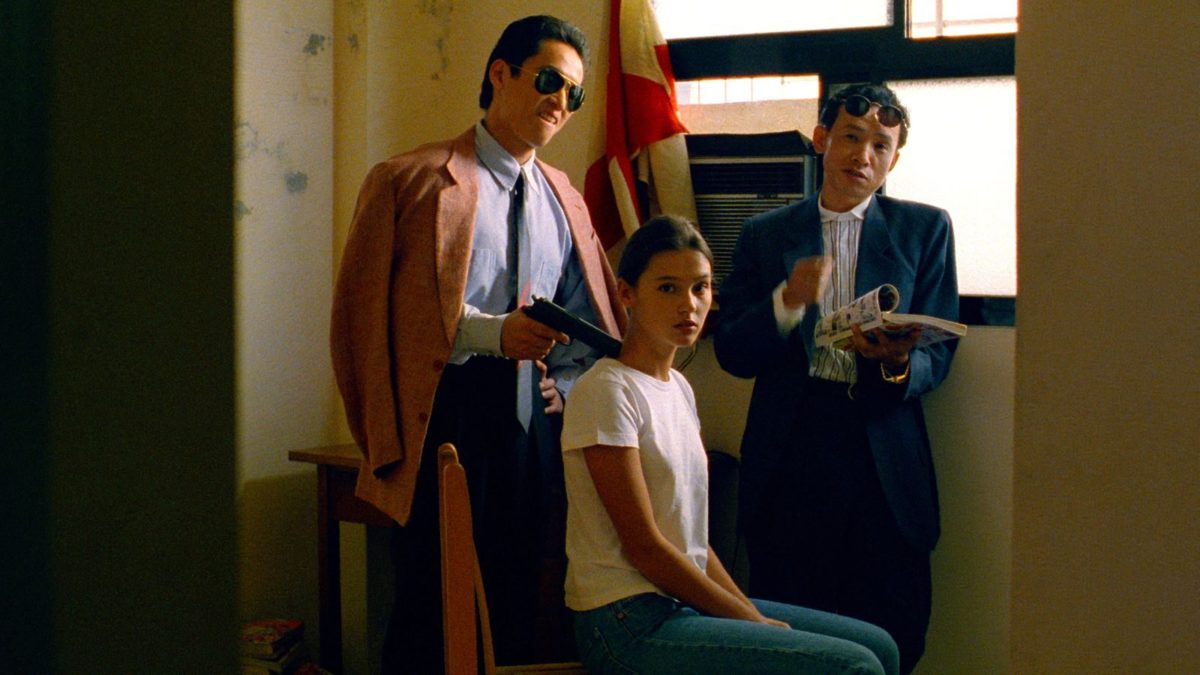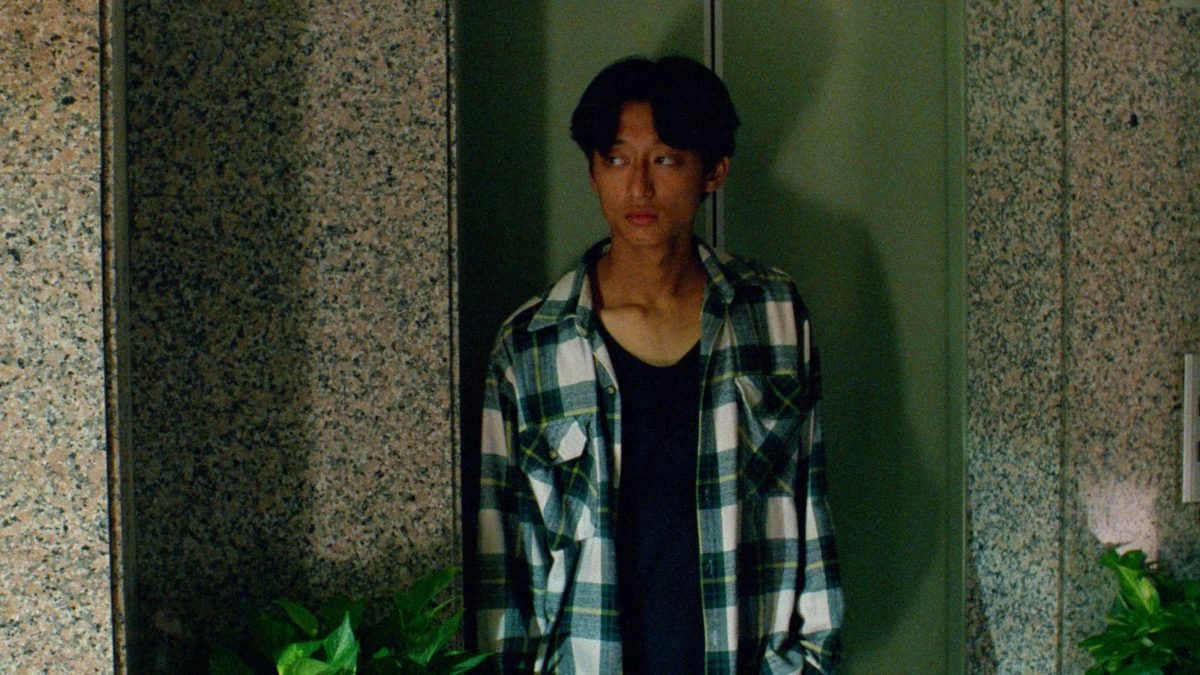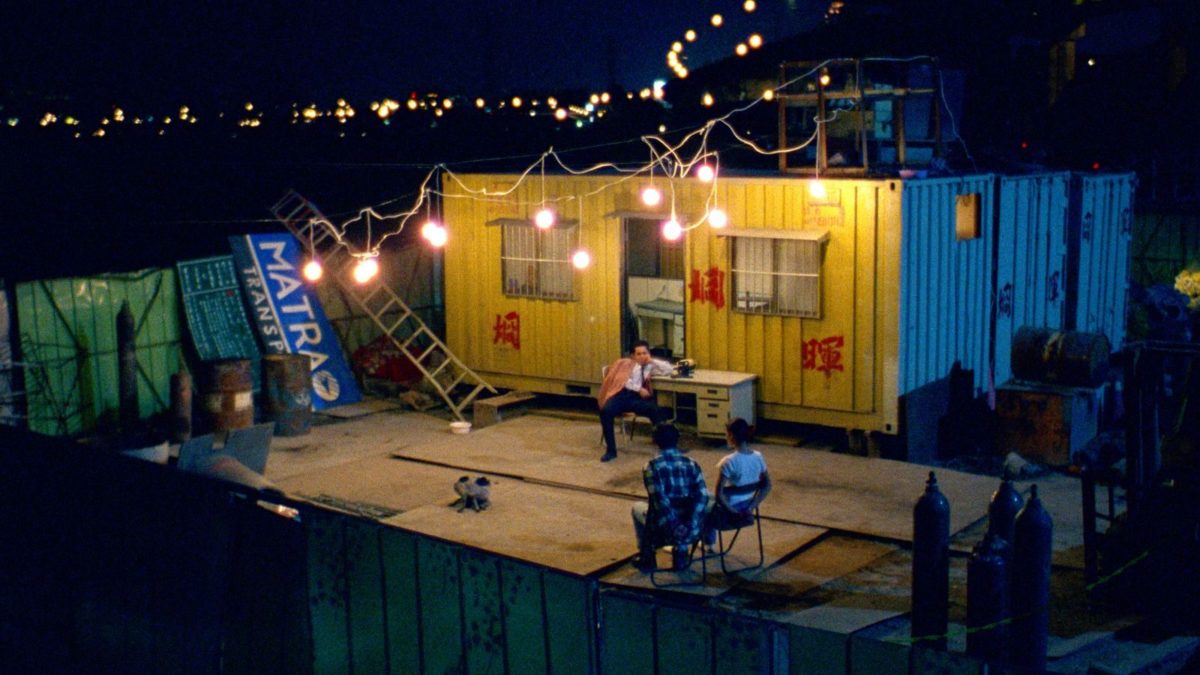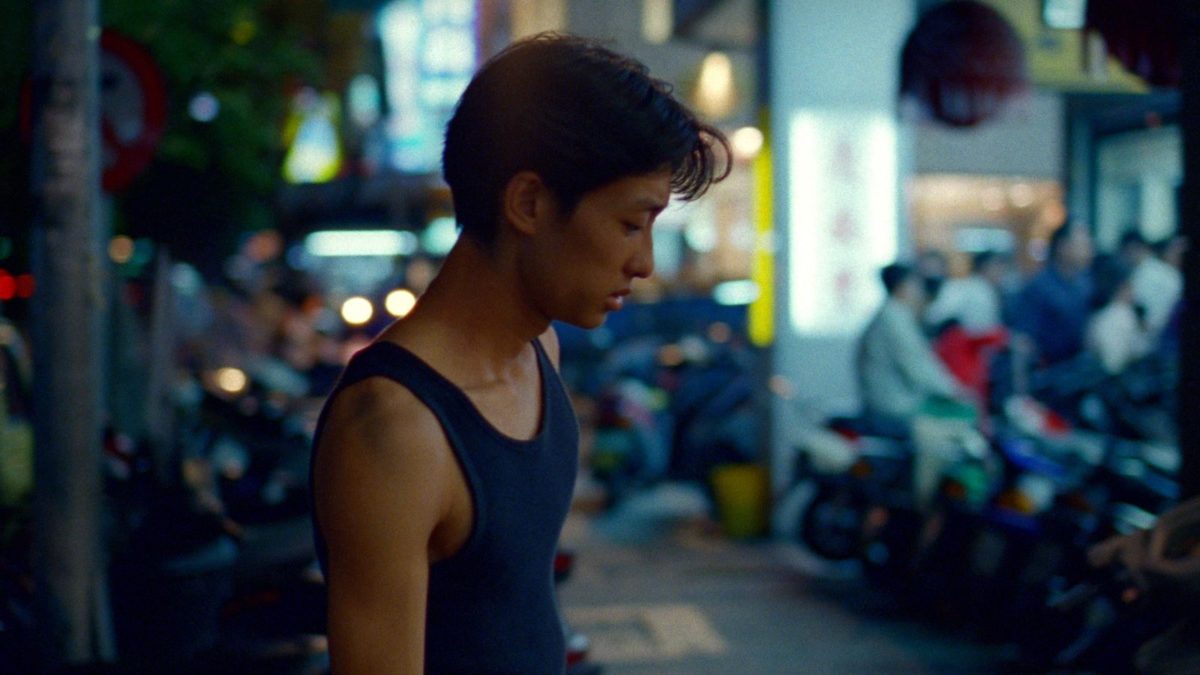Note: This feature was originally published in 2023 as part of Film at Lincoln Center’s Edward Yang retrospective. A Confucian Confusion and Mahjong are now available on The Criterion Collection.
What splits the fine line between desire and expectations? Is it a thing you can see? Is it a thing you can film?
Film at Lincoln Center’s new retrospective supposes that if any of those questions have answers, they might reside in the cinema of Edward Yang. Moving from “A Rational Mind”––the title of their 2011 retrospective of Yang’s work––to “Desire/Expectations” reframes those questions to be more diffuse, less singular. A rational mind could answer in the affirmative or negative; a slash indicates that desire and expectations may occupy the same terrain simultaneously.
“A rational mind” is also, perhaps, an accusation a Yang character could lob at another, especially in A Confucian Confusion (1994), a workplace farce that subjects a “culture company” in 1990s Taipei to the contradictions of Confucian teachings. In turn (or simultaneously), the film interrogates Confucian-influenced, consumer-friendly spaces––like 1990s Taipei––to rethink old-world molds of tradition and expectation. This is not merely a thematic subtext––dogmas and quotations appear in text in-frame while the scene’s action begins off-stage. The dialogue of contemporary characters becomes both an echo and tension with the written text. The effect is of a world out-of-time being pushed towards an edge of something not yet visible to its characters.
A Confucian Confusion pits want against want near-literally in its narrative structure. Molly (Shu-Chun Ni) heads an arts PR company bankrolled by her genially oblivious boyfriend, Akeem (Bosen Wang). Her star client is Birdy (Ye-Ming Wang), a playwright-cum-hack who transmutes images of Confucian wisdom into self-centered, sell-out fare. Molly’s sister (Li-Mei Chen) hosts a popular talk show even as she’s married to an existentially anxious author (Hung Hung), who’s penned a book called A Confucian Confusion and who may or may not be a reincarnation of Confucius himself. Qiqi (Shiang-chyi Chen) is Molly’s assistant and “friend”––as far as their class differences allow––engaged to Ming, a logical (rational?) government bureaucrat who still lives with his parents. Larry (Danny Deng) manages Molly’s business and advises Akeem, playing the estranged-ish couple off one another. The inciting action of the film is Molly’s firing of Feng, an office assistant who then works her way through Larry, Ming, and Birdy in her efforts to become a famous actress. An ephemera of others (Ming’s restaurateur parents, various government workers of mixed moral compass, Birdy’s crush-eyed rehearsal assistant) fill out the film’s over-woven tapestry of an ensemble. As you might expect, everyone desires everyone else, seemingly at different times and always for different reasons.
While the high-low ensemble satire and showbiz-goggled hum of despair pings contemporaneous films like Robert Altman’s The Player (1992) and Woody Allen’s Bullets Over Broadway (1994), the mercurial mood emerging in the collision between desire (for another) and expectation (of happiness) follows the same thread Tsai Ming-liang wrenched on in Vive l’amour (1994). As in Tsai’s work, the comedy of A Confucian Confusion erupts at weird junctures, often as a tension between living absurdly and observing the bleakness of that life. That the film’s mood is confused rather than outraged is a function of a deliberately knotty plot. That the confusion is a cultivated act by Yang is a function of his increased anxiety over the development (and derailment) of Taiwan circa 1994 as a space for living and art-making. Ads for Western products and celebrities litter the desks and walls of this mixed milieu of characters, who knockabout with as little interior insight as we have narrative clarity. One character’s late utterance of “We can meet for a coffee at Friday’s, or something” is as much a heart as it is a head break; this is a world where the possibility of companionship and the combobulation of capitalism rendezvous at the Taipei Friday’s.
A classical reading of A Confucian Confusion might point to the taxi-side “Road to Damascus” scene as the film’s thematic winch. The existentialist (crisis) writer chases down Qiqi’s taxi, convinced that he loves her. After collapsing at the vehicle’s back––and while the confused cabbie tries to understand how a car can hit someone from behind––the writer unfolds an airplane paperback’s worth of philosophy-ish speech at Qiqi, the erstwhile object of desire. The writer, formerly knotted up at the prospect of his early, accessible novels achieving (showbiz version) success while his more recent, serious texts going unread, seems to come to the clarity of optimism: “Isn’t life more fun if we discover something new every day?” Only recently considering the dramatic impact his own suicide might have, he demures, “the best way to fight hypocrisy is not by death but by living honestly!” The outburst ends with Qiqi kneeling, a traffic arrow pointing up and out of the camera’s frame, the writer furiously, happily following its path towards rewriting his books, both his “romantic and tragic” periods at an end. Qiqi considers.
But the film doesn’t end here. It neither endorses the writer’s eureka nor condemns his hope as shallow or contrived. Yang shows us two more scenes of two last trysts, one humming in the bed embrace of Taipei’s hum-blue dawn, another under the harsh fluorescence of hospital light. The true ending transforms the forward slash between desire and expectations into an elevator’s sliding door. It can be filmed––Yang did it, miraculously––but it can’t be described in words really. It has to be felt in images. I still can’t believe the film finds this embrace, amid the romantic lunacy of living, amid its agita.
Romance and agitation are like desire and expectations. Of course they are not opposites, but relationships. Positioning them across from one another is like the careful blocking of bodies in-frame: it fills the great gray of living not with the despair of meaninglessness but the freedom of unknowability, a thoroughly irrational jump. “A rational mind,” then, is a kind of a feint––a prank on Yang himself, who studied electrical engineering in both Taiwan and the United States before he directed a run of films that formed the backbone of the Taiwanese New Wave. Such a linear history culminates in both Yi Yi (2000), which won Best Director honors at Cannes, and his 2007 death due to colon cancer, a still-sharp pain in the consciousness of world cinema.
A Confucian Confusion befuddles this easy narrative. It forgoes the grand re-memory of A Brighter Summer Day (1991) for something like a “little comedy.” Its follow-up Mahjong is even sharper, toothy and obtuse, a jut, a pang. Just as readily as Yang finds improbable elevator desire in the fallout of A Confucian Confusion, Mahjong frustrates any expectation over the possibility of ending happily. To expect it to kiss is to ignore its metric truck-ton of anxieties––over a world turning more modern, over what modernity is forced to be, under the tangled loom of AIDS and the tractor beam of Western capitalism. “Kissing gives a man bad luck,” says the beautiful and damned Hong Kong (Chang Chen). The film is bad luck.
What does it mean to shoot a Taipei Hard Rock like it’s an angel-lit heaven, where soft pinks illuminate only the nastiest, most transactional business? If more ancient wisdom both changed and was changed by the dream of incorporation in A Confucian Confusion, Mahjong finds an austere allure in the depravity / con of making a living. The totem, “Keep in mind, no one knows what they really want / everyone’s waiting to be told what to do” is passed around as readily as romantic partners in the earlier film. The biles culminate in an ending as furious (at the world, at the limits / reaches of cinema) as it is finely blocked––a kind of brutalist ballet of dark neon, obfuscating walls, and how bodies are connected in this world.
Mahjong (courtesy of Janus Films)
To try and unfurl the film’s plot / rules is to describe the holding of a single shot: four young men sit at the table of a knockoff TGI Friday’s. (“Shit. Does this mean no food if you don’t speak English?”) Yang and the camera move the ephemera of a cheeseball capitalism around them, capturing the manufacturing––or worse, commodification––of fortune itself. The young hoods run a spiritual scam: Red Fish (Tsung Sheng Tang) acquires targets and feeds their information to Little Buddha (Chi-tsan Wang), who passes along spiritual warnings to them. Hong Kong seduces them while they receive these cosmic predictions, destabilizing their desires and living situations while newcomer Luen-Luen (Lawrence Ko) translates, shading the truth towards the scam. They rent a kind of HQ flat where they share the women they ensnare in a uniquely ugly living situation. Information is withheld and fabricated while libidos and profit margins unfold in the language of fortune and fate.
Around this central arrangement of bodies moves a constellation of inherited genre devices: a kidnapped millionaire father, the cartoony mobsters chasing him down, a gaggle of femme fatales more in on the joke of their role than at its mercy. The film also introduces alien presences, as it’s not merely Western imagery that populates Taipei but English interior designer Markus (Nick Erickson) and his aggrieved French lover Marthe (Virginie Ledoyen). Even as the two are drawn into the plot’s machinations, it’s readily clear that they move in a different kind of gravity; this space is an amusement park, of a kind, as fit to be plundered as it is existing to give romance unattached to the lives of the people already living there.
A late voiceover––the Brit, obviously, in a role that was allegedly first offered to David Thewlis––makes super-textual tensions that mostly-burbled in A Confucian Confusion: “The future of Western civilization lies right here. And you know what the odd thing is? We used to study history. The 19th century was the glorious age of imperialism, right? Just wait until you see the 21st century.” Like the writer’s taxied realization, the scene is an articulation of theses, though not necessarily the film’s. A film’s ending isn’t its thesis, either, though it is the last impression it leaves, the one that clings to the inner eyelids as the light comes up in the moviehouse. How does Mahjong end? More bad luck, which is to say––thankfully––more kisses.
Earlier in the film, Red Fish warns the green Luen-Luen “never get sentimental when tricking people.” It’s as good a venture for Yang’s filmmaking philosophy, or at least a limb of it. The film tricks us to show a truth. A retrospective is a revisitation, not truth at 24 times per second but a panorama of whose truth and how. In the context of “Desire/Expectations,” A Confucian Confusion and Mahjong present a turbulence to the film historian’s notion of The Great Film. Too often, gesture is mistaken for greatness. Occasionally––as in A Brighter Summer Day (1991), as in Yi Yi (2000)––the gesture towards scope of emotion is matched by an artist’s execution. There is no doubt of the greatness of these films, and any excuse to sit with them in the monolith dark of the moviehouse is welcome. But to consign Yang’s thorny middle ground to the terrain of talky comedy or drifty missive misses the possibility afforded by retrospective, thankfully remedied here with these twin restorations. We see them clearer to feel their edges closer. They cut and cauterize, like a forward slash, like a kiss in the dark.
New 4K restorations of A Confucian Confusion and Mahjong are now playing as part of Film at Lincoln Center’s Desire/Expectations: The Films of Edward Yang, taking place through January 9.




